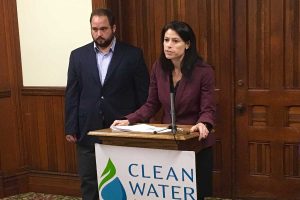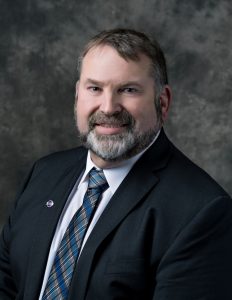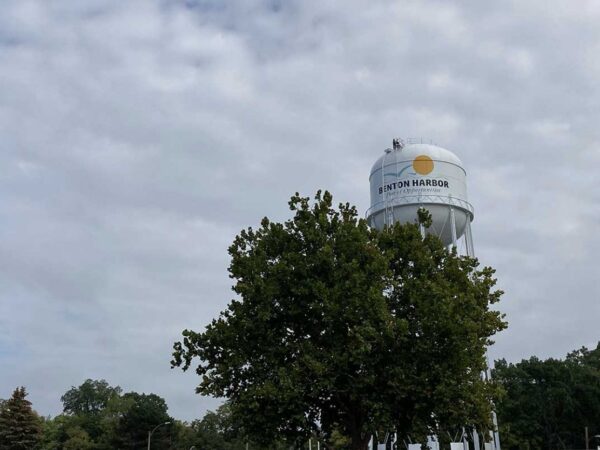
Michigan’s Whitmer hit the ground running; Illinois and Ohio governors cautious on big Great Lakes issues
Michigan Gov. Gretchen Whitmer articulated a big water agenda in her election campaign and wasted no time acting on it when she assumed office.

Dana Nessel with Sean McBrearty at a September press conference in Lansing, Photo by Jim Malewitz via Bridge Magazine
On her first day, she called on the attorney general to conduct a legal review of the controversial law that enables replacement of the Line 5 oil pipeline that runs through the Straits of Mackinac.
And she wasn’t done.
A month later she signed executive orders reorganizing Michigan’s Department of Environmental Quality that included scrapping oversight panels created before she took office that could usurp the agency’s authority.
Contrast that with Illinois and Ohio who have ownership of two of the biggest threats to the Great Lakes, Asian Carp for Illinois and toxic algae blooms for Ohio.
In Ohio, new Republican Gov. Mike DeWine has said little about Lake Erie’s problems except that Ohioans are “united in our desire to protect our magnificent Lake Erie.” The statement comes over four years after the Toledo water crisis where the city was without drinking water for three days due to contamination from a toxic algae bloom.
In Illinois, Gov. J.B. Pritzker inherits the Asian carp conundrum in the state where his two predecessors stonewalled the region on a permanent fix to the carp threat by blocking any infrastructure modifications to the state’s waterways system.
Prior to leaving office, former Michigan Gov. Rick Snyder told Great Lakes Now that he hoped Whitmer and Pritzker would make resolving the carp issue a priority.
Ohio, “talking frequently and working together” and Illinois in transition
Great Lakes Now contacted the Ohio Environmental Protection Agency (OEPA) to see where the agency is on Lake Erie in the new DeWine administration.

Heidi Griesmer, Ohio EPA Deputy Director for Communications, photo by epa.ohio.gov
“The directors of OEPA and Agriculture Resources are talking frequently, working together and will be listening to all involved parties,” said Heidi Griesmer, the agency’s Deputy communications director.
“Gov. DeWine has made it clear that Lake Erie is his top environmental priority and we will be taking a multi-agency approach,” Griesmer said. “We intend to roll out initiatives early in this administration.”
A timeline was not provided.
In Illinois, Department of Natural Resources spokesperson Edward Cross said the agency is still in transition mode so he couldn’t offer a comment on an Asian carp plan.
Asked if Pritzker had discussed the carp issue with Whitmer, Cross referred Great Lakes Now to Pritzker’s office, which did not respond to a request to comment.
Lawsuit in Ohio
While Ohio agencies are “talking” and “listening,” an environmental group is not waiting for the state to roll out a plan.
The Chicago-based Environmental Law and Policy Center (ELPC) filed a new lawsuit in federal district court “seeking a judicial remedy” to reduce the amount of phosphorus that flows to Lake Erie. Phosphorus from farms is the primary source of algae blooms.
“The Clean Water Act provides a specific legal pathway to reduce phosphorus pollution causing harmful algae blooms in western Lake Erie, but U.S. EPA and Ohio EPA refuse to follow the law,” ELPC Executive Director Howard Learner said in a press release.
“The Clean Water Act is the law of the land, but Ohio keeps trying to escape its legal obligation to protect Lake Erie from factory farm pollution,” said co-plaintiff Mike Ferner, a coordinator for Advocates for a Clean Lake Erie.
OEPA’s Griesmer did not comment on the ELPC lawsuit. U.S. EPA does not comment on pending legal action.
Fast start, divided government
In Michigan, Whitmer’s fast start has drawn mixed reviews and potentially set a divisive tone early in the new administration. In her inaugural speech, she called for collaboration by disparate constituencies.
Reactions have been along predictable lines winning praise from her supporters and condemnation from those not traditionally aligned with Whitmer’s politics.
Environmental groups praised her executive order nixing the review panels that would oversee the new version of the DEQ: the Department of Environment, Great Lakes and Energy (EGLE).
“We commend Governor Whitmer for eliminating these undemocratic rule and permit panels,” said James Clift, policy director at the Michigan Environmental Council. “The removal of these committees puts the control of Michigan’s environmental protections back where it should have been all along, into the hands of elected officials who can be held accountable by voters.”
The advocacy group Clean Water Action ran a banner across its website saying “Thank Governor Whitmer for standing up for our water!”
But key business and agricultural interests objected to her action to overturn the law.

Carl Bednarski, President of the Michigan Farm Bureau, Photo by michfb.com
“The Governor cannot singularly eliminate statutes she doesn’t like or agree with via executive order,” Michigan Chamber of Commerce President and CEO Rich Studley said in a press release. “We have three branches of government and the legitimacy of each must be respected.”
Michigan Farm Bureau President Carl Bednarski said Whitmer’s action was “unfortunate” as the panels never had an opportunity to function.
The structure of the panels is based on science, cooperation and rule of law, according to Bednarski who said the panels were enacted to “maintain environmental protection without creating undue regulatory burdens.”
The Michigan Legislature acted quickly to use its authority to overturn Whitmer’s action. The House voted to ditch the executive order last week, and the Senate is expected to take it up this week.
Whitmer’s revamp of the DEQ is important symbolically as she tries to move the agency past the stigma of the Flint water crisis.
But the order did not address funding and staffing deficiencies that have plagued the agency.
Whitmer is expected to propose her first budget in March where funding for the new agency will compete with other priorities including her signature campaign promise to fix Michigan’s roads.
Featured Image: Gretchen Whitmer surrounded by the press, Photo by gretchenwhitmer.com




